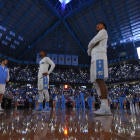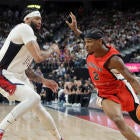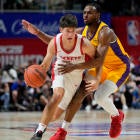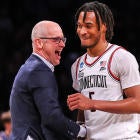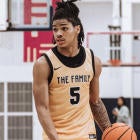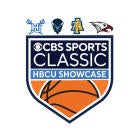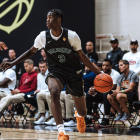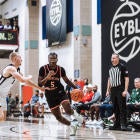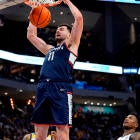The NCAA spent almost four years investigating allegations of academic fraud at the University of North Carolina, sent three different notices of allegations and eventually charged the school with five Level I violations. The punishment came Friday morning. It's basically nothing.
Somebody you've probably never heard of, and who has zilch to do with men's basketball, got a five-year show-cause penalty. And that's it. Despite the NCAA acknowledging this was a scandal featuring student-athletes likely retaining their eligibility by taking bogus courses for more than a decade, no wins will be vacated. No scholarships will be taken away. No postseason bans are on tap. Nobody officially connected to Roy Williams' program, past or present, will be punished.
"While student-athletes likely benefited from the courses, so did the general student body," explained SEC commissioner Greg Sankey, who served as the chief of the Committee on Infractions hearing panel. "Additionally, the record did not establish that the university created and offered the courses as part of a systemic effort to benefit only student-athletes."
OK.
But let's not pretend these classes didn't disproportionately, and by a large margin, benefit student-athletes. Because they most certainly did. Only 4 percent of UNC students are student-athletes, yet nearly 50 percent of the students taking the bogus classes were student-athletes. So the math doesn't lie. And though I understand North Carolina's ability to escape NCAA penalty is essentially rooted in the argument that regular students also benefited from these classes, and that the NCAA, in the context of its bylaws, didn't have a great counter for that, what I also understand is that such an argument does not pass the common-sense test for casual fans or people in general.
Hence, the outrage.
Yes, the NCAA might've technically ruled correctly based on the bylaws in place. But the idea that a school could have roughly 1,000 student-athletes taking fraudulent classes for more than a decade, get caught and still go unpunished means something is very, very wrong with the bylaws in place. Put simply, if your system won't allow you to punish a school caught doing what North Carolina was caught doing, your system is flawed, broken and largely useless.
So this is an embarrassing outcome for the NCAA.
In the same week that it announced the formation of a committee designed to clean up college basketball, and less than a month after the FBI helped expose just how dirty college basketball is, one of the sport's biggest brands was let off the hook. It's a development that shouldn't be too shocking but still kinda is. And it only reinforces the long-held perception among fans, fairly or unfairly, that the NCAA is mostly toothless ... unless you're an insignificant school or Donnie Tyndall.
Either way, the whole thing got me thinking.
North Carolina got off, again, because it successfully argued that members of the general student body accepted the same benefits as its student-athletes -- the point being that whatever inappropriate things happened were never intended to solely benefit student-athletes, and that they never actually did solely benefit student-athletes. Fine. But does that mean a booster could lay $50,000 on a table, and as long as a basketball player and a non-basketball player both picked some of it up no violations have occurred? Could you argue that the $50,000 was never intended to solely benefit student-athletes, and that it never actually did solely benefit student-athletes? I'll tell you one thing: I'd sure as hell try. Because that general defense just worked for North Carolina.
And how stupid does Louisville feel right now?
UNC refused to self-punish and promised to fight till the end and sue if necessary. It's an approach that paid off. And it makes you wonder why any school would concede anything going forward -- especially schools with lots of money like Louisville and North Carolina. Louisville voluntarily acknowledged mistakes and, because of it, will likely soon vacate its 2013 national title. But North Carolina conceded nothing. It instead spent $18 million on lawyers and battled passionately and brilliantly. So North Carolina's championship banners, unlike Louisville's, will hang forever.
And the funny thing is that everybody knew this was probably coming.
I tend to roll my eyes when fans scream about how the NCAA rarely does anything to punish the big and powerful institutions even when they're caught doing wrong, mostly because it's an opinion not totally rooted in reality, which is why I've spent years telling fans to stop screaming about North Carolina until the NCAA actually rules on North Carolina. Let's wait and see, I said. But guess what? Those skeptical and cynical fans were right. North Carolina was caught in what some have called the biggest academic scandal in college sports history. And the punishment is nothing. Embarrassingly, but unsurprisingly, the punishment is nothing.
Get the latest on this developing story from insiders on the ground at Chapel Hill. They've been covering Carolina athletics for two decades and will have all of the fallout, including recruiting impact and what's coming next. Visit InsideCarolina.com right now.









